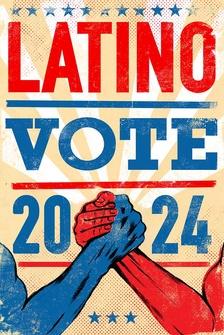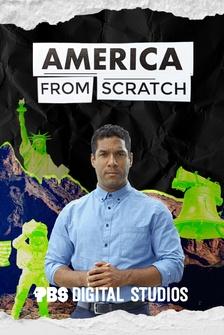AMNA NAWAZ: For more on the tight race for the White House, I'm joined by our Politics Monday team.
That's Amy Walter of The Cook Political Report With Amy Walter and Tamara Keith of NPR.
It's great to see you both.
TAMARA KEITH, National Public Radio: Good to be here.
AMNA NAWAZ: Can't believe it's finally here.
AMY WALTER, The Cook Political Report: I know it.
AMNA NAWAZ: Here we go.
AMY WALTER: Election eve, my favorite eve of all time.
AMNA NAWAZ: Of all the eves.
AMY WALTER: Of all the eves.
(LAUGHTER) AMNA NAWAZ: I want to ask you about that new PBS News poll we have got, Tam, because you saw there, as Lisa reported earlier, Harris with her first national lead that's outside the margin of error, just four-point lead among likely voters at a 3.5 percent margin of error on that poll.
But you have been in the battleground states.
You were in Arizona, Wisconsin, Nevada.
That's where the races are won or lost.
Are you seeing any shift that tells you which way this race is going?
TAMARA KEITH: I have spoken to a lot of people who believe it's really, really close.
So I don't know that you -- when you're out there in these states, it's like you're looking at the toenail of an elephant, but you don't know whether it's a rock or an elephant.
And so what I will say is that I was covering Harris.
I was going to some of her events.
The enthusiasm is quite intense among her supporters who are showing up at these events, 10,000, 12000 people showing up.
One thing that really stood out to me was, we were in Wisconsin.
She did a rally in a town called Little Chute, which is a population-12,000 town in a county that went for Trump.
And there was a lot of enthusiasm in that gymnasium.
Driving up, there were a supporters outside waving and banners.
But then you get a little bit closer and you see this long line of people who didn't get into the event because it was oversold.
Inside, there was a lot of enthusiasm.
That is part of their effort to lose by less in areas, more rural areas outside of the urban centers.
Now, is this part of a big trend and we're going to see, oh, well, gosh, she lost by less in all these counties out there, and that's how she won?
I don't know.
AMNA NAWAZ: Yes.
TAMARA KEITH: No idea.
AMNA NAWAZ: Yes.
Amy, what do you think?
AMY WALTER: It still feels to me like we're coming down to Pennsylvania, like we did last time.
AMNA NAWAZ: Yes.
AMY WALTER: And, once again, it is a combination of for both candidates losing by a little bit less in certain areas, winning by a little bit more.
There are going to be some swing counties that may tell us the story early on in the night, especially in the northeastern part of the state in those places around Scranton, in Northampton County, in Bucks County, that could give us a sense of who's doing a little bit better, a little bit worse than the numbers were in 2020.
AMNA NAWAZ: I have to ask you, though, about Iowa.
AMY WALTER: I know.
Everyone is talking about Iowa.
AMNA NAWAZ: Because this poll by - - she's a renowned pollster... AMY WALTER: I know.
Absolutely.
AMNA NAWAZ: ... Ann Selzer, we should say, highly respected.
AMY WALTER: Absolutely.
AMNA NAWAZ: This poll that shows her -- that shows Harris leading Trump in a state that he won easily twice, what does that say to you about Iowa or what it means for others?
AMY WALTER: I know it.
And she -- it's not just that she's well-renowned.
She's also well-renowned for being an out -- what looks like an outlier in 2020 and in 2016.
AMNA NAWAZ: Yes.
AMY WALTER: She was showing in Iowa basically the opposite of what a lot of people thought that was going to happen, not just in Iowa, but nationally.
And she ended up being right.
So I think that's why she gets a lot more weight than any other poll.
Part of the challenge we have with Iowa, because it's not a swing state, we don't have a lot of other pieces of data.
What we do have, though, are competitive House races there that are showing Harris doing a little bit better... AMNA NAWAZ: Yes.
AMY WALTER: ... than what -- how Biden did in those competitive districts.
So there is, there is a sense that, in those places where Democrats are competing, Harris is also doing a little bit better there.
Those areas where Harris is doing a little bit better, they are in more urban areas like around Des Moines or college towns like Iowa City.
The other thing that I think is really interesting is, this is driven, the lead for Harris in this poll, by independent women, older women.
AMNA NAWAZ: Yes.
AMY WALTER: You know where else we have seen some swings to Harris in states that aren't very -- aren't polled very often?
Kansas, Nebraska, Plains states, which also have a overwhelmingly white population, where older women are going to have a bigger part,they play a bigger part because of the demography of that state, and also places where abortion has played a big role, the Kansas initiative, of course, in 2022.
And in Iowa, there's a six-week ban that is very unpopular.
A poll that came out, I think, in September showed 70 percent of women in Iowa disapprove of that six-week ban.
AMNA NAWAZ: Yes.
Tam, I know you have reported on this.
We have talked about the gender gap before.
We know abortion is on the ballot in 10 different states, including Arizona and Nevada.
How much of an issue is it going to be tomorrow?
TAMARA KEITH: I don't see how it can't be a big issue.
It is a defining issue in this race.
It's a defining issue in the way Harris has campaigned.
It's also defined Trump's campaign and his effort -- when he the other day said, "I'm going to protect women, whether they like it or not," he was talking about his -- his policy on abortion and other issues.
He continues to try to figure out a place to be on this issue, which is challenging ground.
Republicans won.
He -- Trump got the Supreme Court that he wanted.
The Republicans got this issue where they wanted it.
And now it's a challenge for them, because a lot of voters, especially women, are upset.
AMNA NAWAZ: You agree with that, Amy?
AMY WALTER: Yes.
Yes, I do think that is part of it.
And I have said sort of fundamentally what this race really is about for -- especially for the undecided voters right now... AMNA NAWAZ: Yes.
AMY WALTER: ... but what it's been about for a lot of voters all along, is the sense of, who is the bigger risk?
If you don't like either candidate, which candidate is going to be less risky and what does it mean to have control and choice?
And some of it is about abortion.
Some of it too is about the kind of country that they want to live in.
So it's going to cut different ways.
The other thing that's really hard in polling the issue of abortion is, it doesn't necessarily show up as abortion.
This is why you hear Harris talking about it as control, freedom, right, that this is less about the issue of abortion and more about this idea that, when I talk about -- an individual voter would say, when I talk about control or freedom, I mean this.
And for many voters, it means reproductive control.
AMNA NAWAZ: Tam, as you know, you have been covering this race.
It's been largely stuck at 50/50 for many, many months.
Lisa reported earlier on those key battlegrounds in particular, where we have not seen a lot of movement, one or two points the -- one direction or the other, within the margin of error.
As you're watching tomorrow, as results start to come in, as we get a sense of where things go, what are you going to be tracking?
What are you looking at most closely.
TAMARA KEITH: Well, and I will say that our poll shows Trump at 47 percent, which is where he was in 2020.
It's where he was in 2016.
For all of the things that this country and this campaign has been through, for him to be in exactly the same place is quite remarkable.
Whether he lands there, I don't know.
But I'm -- that is one thing I am definitely watching.
And I will be watching North Carolina and Georgia, because their returns are likely to come in earlier than some of the other states.
I will be watching there to see how that goes.
If Trump wins those states, then all eyes go to the blue wall.
AMY WALTER: Absolutely.
TAMARA KEITH: And if he doesn't, then this is a different race.
AMNA NAWAZ: What does that say to you if he doesn't?
TAMARA KEITH: If he doesn't, then there's a path, but it's not an easy path.
AMY WALTER: Exactly.
I think that's right.
And there are also congressional races in those places that can also give us a clue maybe to how the presidential race is going, especially if the House races get called earlier, but also could give us -- at least tip the hand of where House control is going.
It's unlikely we're going to know until long after Wednesday, because so many of the competitive House races are on the West Coast in states like California that do take longer time to count their ballots.
But I'm -- there are competitive House races in some of these battlegrounds, Michigan, Pennsylvania, that will also give us early on in the night at least a sense, if the race is breaking one way or the other, which way it's going.
AMNA NAWAZ: I got to ask, even though I don't know if either of you will answer, do you care to make a prediction about what we're going to see tomorrow?
AMY WALTER: Absolutely no.
TAMARA KEITH: No.
No.
(LAUGHTER) TAMARA KEITH: I don't even predict whether we will know by the end of the night.
So it's probably a safe bet that we... AMY WALTER: I can predict it will be earlier -- I will make a just prediction, that it will not be Saturday by the time we know... AMNA NAWAZ: OK. AMY WALTER: ... like it was last time.
AMNA NAWAZ: We will take that.
AMY WALTER: OK. AMNA NAWAZ: From Amy Walter's mouth to our... AMY WALTER: Oh, no.
(LAUGHTER) AMNA NAWAZ: Amy Walter, Tamara Keith, great to see you.
Thank you.
AMY WALTER: Thank you.
AMNA NAWAZ: And we hope that you will join us for a live election night coverage tomorrow as the votes are counted.
Our livestream online begins at noon Eastern, and then special coverage right here on your PBS station starts at 7:00 p.m.










